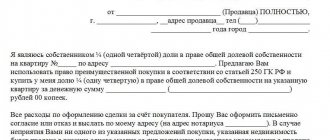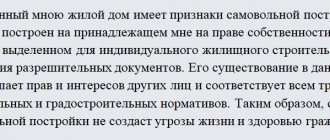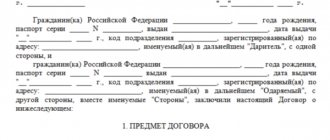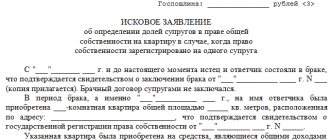The grounds for termination of property rights should be understood as reasons and circumstances in the presence of which property cannot exist as a property right.
The norms of Article 235 of the Civil Code of the Russian Federation are general in relation to other articles of Chapter 15 of the Civil Code of the Russian Federation. This article discusses the grounds for termination of property rights, which can be classified into voluntary and forced, compensated and gratuitous. In addition, grounds for termination of property rights are provided, which may not depend on the will of the subjects of civil legal relations, in particular the death or destruction of property, for example, by virtue of Art. 211 of the Civil Code of the Russian Federation (risk of accidental loss of property).
Article 235 of the Civil Code of the Russian Federation contains an exhaustive list of grounds for termination of property rights. Taking into account the volitional criterion (or the nature of the loss of property), the following grounds are identified that terminate the right of ownership:
- at the will of the owner (clause 1 of article 235, article 236 of the Civil Code of the Russian Federation), i.e. on a voluntary basis;
- against the will of the owner (clause 2 of article 235, article 237 - 243 of the Civil Code of the Russian Federation), i.e. forcibly.
Methods of deprivation of property rights
Deprivation of ownership of real estate very often becomes the subject of legal disputes. Each owner should know his rights to own property in order to avoid possible problems. Let's consider in what cases a person can be deprived of the right to own real estate. Let's look at the instructions and methods for depriving property rights.
In accordance with the current Constitution of the Russian Federation, it is possible to deprive the owner of his right to an apartment only by a court decision. No other authority has the power to deprive a person of ownership of his property. Most often, the subject of dispute is real estate. A person may not live in the living space or be registered on it, but this does not prevent him from being the owner of this premises.
The basis for deprivation of property rights may be confiscation and foreclosure of property
. Real estate can be taken away by a court decision or taken away for debts. For example, if we are talking about an apartment purchased with a mortgage. It is the property of the bank and in case of violation of the terms of the contract by the borrower, the housing becomes the property of the bank.
But banks take such measures only as a last resort. It is much more profitable for them to renegotiate the terms of the mortgage loan. In addition, you can only take away an apartment in which one of the owners is a minor child if the guardianship authorities give their consent. It is also considered a prerequisite that the child must have other housing suitable for living.
In some cases, ownership of real estate is taken away in favor of the state. For example, this may happen if this object is needed to accommodate objects of municipal or state significance. In this case, the owner will be paid compensation commensurate with the market value of the property.
The question often arises about the eviction of utility
. Please note that in this case it is impossible to forcibly evict a person from a residential premises. He can only voluntarily give up the apartment to pay off the accumulated debt.
When an inheritance is made public, the right to property passes to the heirs determined by law or by this very will. In the event that there is a testamentary refusal, then in addition to the persons referred to in the will, the obligatory share must go to disabled first-degree relatives, if any.
These provisions are enshrined in the current Civil Code. To deprive any of the heirs of the right of ownership
on real estate, it is necessary to take certain actions in advance.
The testator has the right to dispose of his property during his lifetime and indicate the persons to whom it will be transferred in the will. In this case, after the death of the owner, inheritance of his property will occur according to the will. If at the time of death the testator had children, a spouse or parents recognized as disabled, then they are required to share the inheritance.
A way to deprive an heir of ownership of an apartment may be the option of selling the apartment or donating it.
. To ensure that the transaction is not invalidated after the death of the testator, the option of buying and selling property is preferable, since the gift agreement is easier to challenge in court.
Civil Code of the Russian Federation Part 1
| Previous chapter | Content | Next chapter |
| Section II. OWNERSHIP AND OTHER PROPERTY RIGHTS |
Chapter 15. TERMINATION OF OWNERSHIP
Article 235. Grounds for termination of ownership rights
1. The right of ownership shall terminate when the owner alienates his property to other persons, the owner renounces the right of ownership, the destruction or destruction of property, and when the right of ownership to property is lost in other cases provided for by law.
2. Forced seizure of property from the owner is not permitted, except in cases where, on the grounds provided for by law, the following is carried out:
1) foreclosure on property for obligations (Article 237);
2) alienation of property that, by virtue of law, cannot belong to a given person (Article 238);
3) alienation of real estate in connection with the seizure of a plot (Article 239);
4) redemption of mismanaged cultural property and domestic animals (Articles 240 and 241);
5) requisition (Article 242);
6) confiscation (Article 243);
7) alienation of property in cases provided for in paragraph 4 of Article 252, paragraph 2 of Article 272, Articles 282, 285, 293, paragraphs 4 and 5 of Article 1252 of this Code; (as amended by Federal Law dated December 18, 2006 N 231-FZ)
 conversion by a court decision into the income of the Russian Federation of property in respect of which, in accordance with the legislation of the Russian Federation on anti-corruption, evidence of its acquisition with legal income has not been provided; (Clause 8 introduced by Federal Law dated December 3, 2012 N 231-FZ)
conversion by a court decision into the income of the Russian Federation of property in respect of which, in accordance with the legislation of the Russian Federation on anti-corruption, evidence of its acquisition with legal income has not been provided; (Clause 8 introduced by Federal Law dated December 3, 2012 N 231-FZ)
9) application by a court decision to the income of the Russian Federation of money, valuables, other property and income from them, in respect of which, in accordance with the legislation of the Russian Federation on countering terrorism, the person has not provided information confirming the legality of their acquisition. (Clause 9 introduced by Federal Law dated November 2, 2013 N 302-FZ)
By decision of the owner, in the manner prescribed by privatization laws, property in state or municipal ownership is alienated into the ownership of citizens and legal entities.
The conversion into state ownership of property owned by citizens and legal entities (nationalization) is carried out on the basis of law with compensation for the cost of this property and other losses in the manner established by Article 306 of this Code.
Article 236. Renunciation of ownership rights
A citizen or legal entity may renounce the right of ownership of property owned by him by declaring this or taking other actions that definitely indicate his removal from the possession, use and disposal of property without the intention of retaining any rights to this property.
Relinquishment of the right of ownership does not entail the termination of the rights and obligations of the owner in relation to the relevant property until the acquisition of ownership of it by another person.
Article 237. Levy of execution on property for the obligations of the owner
1. Seizure of property by foreclosure against the owner’s obligations is carried out on the basis of a court decision, unless a different procedure for foreclosure is provided for by law or agreement.
2. The right of ownership to the property subject to foreclosure shall cease with the owner from the moment the right of ownership to the seized property arises from the person to whom this property is transferred.
Article 238. Termination of a person’s right of ownership to property that cannot belong to him
1. If, on the grounds permitted by law, a person owns property that by force of law cannot belong to him, this property must be alienated by the owner within a year from the moment the right of ownership to the property arises, unless a different period is established by law.
2. In cases where the property is not alienated by the owner within the time period specified in paragraph 1 of this article, such property, taking into account its nature and purpose, by a court decision made at the request of a state body or local government body, is subject to forced sale with transfer to the former to the owner of the proceeds or transfer to state or municipal ownership with compensation to the former owner for the value of the property determined by the court. In this case, the costs of alienation of property are deducted.
3. If in the ownership of a citizen or legal entity, on grounds permitted by law, there appears to be a thing for the acquisition of which a special permit is required, and its issuance to the owner is refused, this thing is subject to alienation in the manner established for property that cannot belong to this owner.
Article 239. Alienation of real estate in connection with the seizure of the plot on which it is located
1. In cases where the seizure of a land plot for state or municipal needs or due to improper use of the land is impossible without termination of ownership of buildings, structures or other real estate located on this site, this property may be seized from the owner through redemption by the state or sale from public auctions in the manner provided, respectively, by Articles 279 - 282 and 284 - 286 of this Code.
The demand for seizure of real estate is not subject to satisfaction unless the state body or local government body that filed this demand with the court proves that the use of the land plot for the purposes for which it is seized is impossible without termination of the right of ownership to this real estate.
2. The rules of this article are applied accordingly when the right of ownership to real estate is terminated in connection with the seizure of mining allotments, water bodies and other isolated natural objects on which the property is located. (as amended by Federal Law No. 118-FZ of July 14, 2008)
Article 240. Redemption of mismanaged cultural property
In cases where the owner of cultural property, classified in accordance with the law as especially valuable and protected by the state, mismanages these values, which threatens them with losing their value, such values, by a court decision, can be confiscated from the owner through redemption by the state or sale at public auction .
When purchasing cultural property, the owner is reimbursed for its value in the amount established by agreement of the parties, and in case of a dispute, by the court. When selling at public auction, the proceeds from the sale are transferred to the owner minus the costs of conducting the auction.
Article 241. Redemption of domestic animals in case of improper treatment of them
In cases where the owner of domestic animals treats them in clear contradiction with the rules established by law and the norms of humane treatment of animals accepted in society, these animals can be seized from the owner by buying them out by a person who has submitted a corresponding demand to the court. The ransom price is determined by agreement of the parties, and in case of a dispute, by the court.
Article 242. Requisition
1. In cases of natural disasters, accidents, epidemics, epizootics and other circumstances of an emergency nature, property in the interests of society, by decision of state bodies, may be confiscated from the owner in the manner and under the conditions established by law, with payment to him of the value of the property (requisition ).
2. The assessment, according to which the owner is reimbursed for the value of the requisitioned property, may be challenged by him in court.
3. A person whose property has been requisitioned has the right, upon termination of the circumstances in connection with which the requisition was made, to demand in court the return of the remaining property to him.
Article 243. Confiscation
1. In cases provided for by law, property may be confiscated from the owner free of charge by a court decision in the form of a sanction for committing a crime or other offense (confiscation).
2. In cases provided for by law, confiscation may be carried out administratively. A decision on confiscation made administratively may be challenged in court. (as amended by Federal Law dated December 18, 2006 N 231-FZ)
| Previous chapter | Content | Next chapter |
Loss of property rights due to mismanagement
At first glance, this may seem very doubtful, but mismanagement and negligence can serve as valid reasons for the eviction of a tenant, both from public housing and from an apartment owned by them.
This issue is regulated by the Civil Code, namely article number 293
. It implies the termination of ownership of unmanaged housing and describes the procedure for action in this situation.
If the owner of the apartment does not monitor its maintenance, does not carry out the necessary routine repairs, violates public order and disturbs neighbors with his behavior, then the authorized body must issue him a warning, which will indicate the time frame for carrying out the necessary work.
If the owner does not take any measures to eliminate the identified deficiencies, the administration files a claim in court. If the claim is satisfied, a decision will be made to sell the residential premises at auction. The funds received will be paid to the owner, minus the costs of home repairs, which the authorized body encouraged to do voluntarily.
Register now and get a free consultation from Specialists
Deprivation of property rights of mortgage debtors
An apartment purchased with a mortgage is the property of not only the buyers, but also the bank that issues the loan. This property can be seized even if the residents have no other living space. Therefore, the courts in most cases satisfy the claims of creditors and force the owners to sell real estate at auction.
The bank client, after selling the property, will receive the proceeds in his hands. Please note that the final amount will be issued minus the funds borrowed from the bank. Therefore, the client has the opportunity to use the remaining funds to purchase a smaller apartment.
Legal grounds for deprivation of ownership of a share in an apartment
This can only be done in a number of cases. Let's take a closer look at these situations:
- Voluntary consent of all shareholders. This is possible if all owners find a compromise solution that suits all shareholders.
- Deprivation of property rights based on a court decision. The reasons for going to court must be compelling, and the plaintiff must have grounds to demand the deprivation of property rights of one or all shareholders.
- Forced purchase of a small share in an apartment. This is the most real and common case, which occurs most often in practice.
Each person chooses which method to use to deprive ownership of a share individually, based on the current situation within the family. Most importantly, you must act according to the law, and for this you need to have good reasons for these actions.
How to deprive a share in a privatized apartment without consent
In order to recognize a part in an apartment belonging to one of the co-owners as insignificant, the following conditions must be present:
- Small share size. Not always the same number of square meters (or the size of the share) will be recognized by the court as insignificant. For example, 1/5 in a one-room apartment (6 sq. meters) and 1/5 in a large five-room apartment (37 sq. meters). It is clear that in the second case, the area owned by the co-owner is not so small and can be commensurate with the size of a separate room.
- Reluctance to participate in maintenance and management. If a person does not permanently live in the specified housing, does not pay utility bills for it, and does not participate in maintaining its normal condition (repairs). In this case, you will have to prove to the court that this is really the case. For example, provide an extract from the payment center, an apartment card, a certificate from the local police officer, present witnesses (neighbors) to the court, etc.
- No urgent need for housing. When a co-owner, in addition to the disputed share in your common apartment, also has other real estate. This is what will indicate that the disputed part of the housing is not the only place to live.
Only the combination of all these signs will allow the court to make a decision in your favor.










